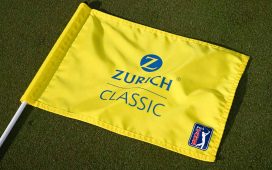The top 50 golfers on this year’s European Tour will fight it out this week to claim the final event of the season at the DP World Tour Championship, Dubai, which is worth $2 million to the winner.
For some players, the even bigger prize is winning the 2019 Race to Dubai, the European Tour’s championship, which this tournament often determines.
Traditionally, the European Tour has played a secondary role to the PGA Tour in the United States, where prize money has been higher. While the money on the European Tour has increased, tradition and prestige remain important to many players.
Francesco Molinari of Italy, who won the Race to Dubai for the first time last year, said the history of the European Tour means that being its No. 1 counts for more than just money.
“It is an amazing list of past champions, and sometimes I can’t quite believe that my name is now alongside them,” he said. “It does make me feel proud to think of it.”
Originally known as the European Tour Order of Merit, it listed players according to prize money earned, with the winner receiving the Harry Vardon Trophy, named after the man who won the United States Open and six British Opens in the late 19th and early 20th centuries.
In 2009, it became the Race to Dubai. The prize money earned in each of its 47 tournaments is converted into points and weighted according to the status of the event. Winning the race also brings prize money, and it has increased sharply over the years.
When Peter Oosterhuis of England won his fourth straight Order of Merit crown in 1974, he won $49,500 for the whole season, with no bonus for winning the race. Last year, Molinari earned $5.73 million for the season, which included a $1.25 million race bonus.
The top five players in this year’s Race to Dubai will share $5 million in bonus money, $2 million of which will go to the winner.
Molinari’s victory in the British Open in 2018 set him up to win the Race to Dubai and join such golfers as Severiano Ballesteros, Nick Faldo, Bernhard Langer, Sandy Lyle, Colin Montgomerie, Justin Rose and Rory McIlroy as previous winners who became the European Tour’s No 1. Montgomerie holds the record with eight wins.
“It was a very special award to end what was the best year of my career so far,” Molinari said. “I was very proud to win the Race to Dubai, and it capped off a wonderful year of achievements. I think being Europe’s No. 1 was a recognition of the whole year — nothing will cap the particular feelings of winning the Open and the Ryder Cup, but it is definitely a very proud achievement.”
The status of the European Tour was boosted in the late 1970s by a strong generation of players. Ballesteros, Langer, Lyle, Faldo and Ian Woosnam won 16 majors from 1979 to 1996.
Expanding the Britain and Northern Ireland Ryder Cup team in 1979 to include players from continental Europe was also crucial in enhancing the European Tour’s standing. Six years later, Europe beat the United States — the first time America had lost since 1957 — and Europe has won 11 of the 16 meetings since.
The tour has long since expanded outside of Europe. The Tunisian Open was the first event to be added, in 1982, and of the tournaments in the 2019 Race to Dubai, which includes the four majors and the four World Golf Championships events, more tournaments are played outside Europe than inside it.
As a result, being the European Tour’s No. 1 is not an exclusively European battle. Just like the PGA Tour, it is open to all nationalities and has always been a breeding ground for players from all parts of the world.
Greg Norman, the Australian former world No. 1 and twice the British Open champion, won the Order of Merit in 1982, and the South Africans Ernie Els and Retief Goosen each won it twice in a row in the 2000s.
The record $15 million that went to this year’s winner of the FedEx Cup series dominated headlines at the end of the season in the United States, but in some ways the European Tour, and the race to be European No. 1, has taken on more relevance because of the calendar.
The FedEx Series finishes in August, benefiting the European Tour by allowing it to showcase its finale without having to compete for airtime with PGA Tour events.
Bernd Wiesberger of Austria is leading the Race to Dubai, with Tommy Fleetwood of England, Jon Rahm of Spain, Shane Lowry of Ireland and Matthew Fitzpatrick of England still in contention.
Wiesberger, who has won three tournaments this year, said winning the Race to Dubai “would be an amazing achievement for me and my team.”
“Most of the great champions of Europe have won this title, so it would be a huge privilege and honor to add my name to this list,” he said.
“I missed the majority of the 2018 season through injury, so my main goal at the start of the season was to try and get back to where I left off at the start of 2018.
“I started the season poorly from a performance perspective, but in late spring managed to turn this around. I then went on to have some great results and have made playing for the title a realistic goal.”
Rahm is in third place despite taking six weeks off leading to Dubai. The break reduced his chances to win points, but Rahm knew he would be fresh for the big one at the end. If he wins, he will be the first Spanish player to win the race since 1991.
“In Europe, it would be a little more special just because the last Spaniard to win the Race to Dubai was Seve Ballesteros,” he said in 2017 when he was in contention to win the race. “Neither Sergio [Garcia] nor [Jose Maria] Olazabal have been able to do it.’’
Lowry won his first major this summer with a victory in the British Open and said recently that he would love to finish the year as No. 1.
“It’s my main goal over the next few weeks to perform as best as I can,” he said. “It would be lovely if I got to the final 18 holes in Dubai with a chance to win the Race to Dubai.
“To be European No. 1 would be really special and would add to the year I’ve had,” he said. “I think it would be the icing on the cake.”








